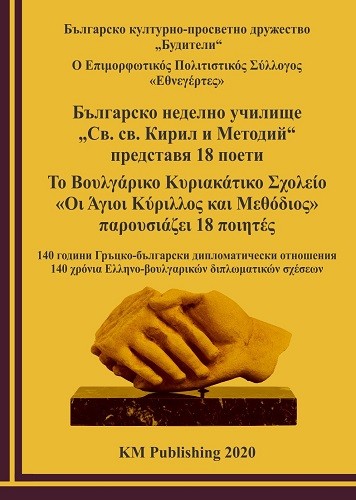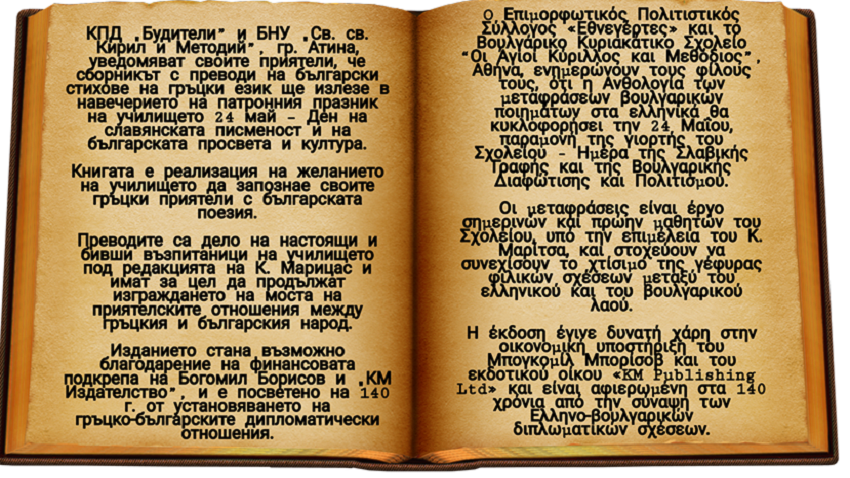The oldest Bulgarian weekend school in the Greek capital bears the names of the men who created the Slavic alphabet – saints Cyril and Methodius. The school was set up by ambitious parents and teachers in 2004. Today it is attended by close to 190 children – from the age of 3-4 to the 12th grade. For all of them 24 May is a day they very much look forward to. But this year, because of the pandemic, school teachers and school children will not be getting together. Still, they will be celebrating 24 May – with a new book.
 To mark the patron saints’ day of their school, the Day of Slavonic Alphabet, Bulgarian Enlightenment and Culture, the Bulgarian weekend school “Saints Cyril and Methodius” put together a collection of translations of Bulgarian poetry by 18 authors. The book came about because teachers and students in Athens wanted to acquaint their Greek friends with part of the Bulgarian literary heritage. The collection includes poems by authors from the age of the National Revival – Petko Rachov Slaveykov, Ivan Vazov, Pencho Slaveykov, as well as poets from more modern times – Damyan Damyanov, Hristo Fotev, Nedyalko Yordanov etc.
To mark the patron saints’ day of their school, the Day of Slavonic Alphabet, Bulgarian Enlightenment and Culture, the Bulgarian weekend school “Saints Cyril and Methodius” put together a collection of translations of Bulgarian poetry by 18 authors. The book came about because teachers and students in Athens wanted to acquaint their Greek friends with part of the Bulgarian literary heritage. The collection includes poems by authors from the age of the National Revival – Petko Rachov Slaveykov, Ivan Vazov, Pencho Slaveykov, as well as poets from more modern times – Damyan Damyanov, Hristo Fotev, Nedyalko Yordanov etc.
“The translations are by present students and former alumni of the weekend school, they are edited by eminent writer and translator Konstantinos Maritsas and aim to continue building the bridge of friendship thrown between the Greek and the Bulgarian nation,” says Mimi Nicheva, long-time headmistress of the school:
“The idea for this collection of poems came about 3-4 years ago when a Greek poet of high standingwas presented at the school whose poetry had been translated into Bulgarian. At the time I said to the translator it would be nice if we could do the opposite – translate Bulgarian literature into Greek. Bulgarian literature has been translated in the past, but only specific authors. It took the children literally a couple of weeks to choose the works and do the translations, the idea being to have one-two works by each poet. We put them in chronological order. I got in touch with the translator and he was delighted with the idea, and he did an excellent job with the editing. The book is now on sale, on the occasion of 24 May, and very much in time for the 140th anniversary of Greek-Bulgarian diplomatic relations. Our idea could be taken up by other schools around the world because it is such a good way to spread Bulgarian culture outside Bulgaria.”

The people who compiled the book say it would even be helpful to students at the university in Athens where a department of Russian language and literature and Slavic studies was set up three years ago, with Bulgarian as an optional second Slavic language.
“Our school, and the other schools in Athens, is attended by children who are well motivated to learn the Bulgarian language and literature. This is so because their chances of being admitted to universities in Greece are slim. Our pupils opt for universities in Bulgaria and this means they have to be well tutored for their studies there. This motivation is something that comes to them when they reach the age of 15-16. I have been at this school for 10 years and I can say that 60% of the children who have graduated from the “Cyril and Methodius” school are students at universities in Bulgaria.”
The documentary film The Spiritual Mirror of Christian Nessebar produced by the Bulgarian National Television has received a total of four awards at three prestigious international film festivals in Brazil, Georgia and Portugal. The..
Bulgarian writer Georgi Gospodinov will receive the Order of Art and Letters - Knight degree, at a ceremony this evening at the residence of the French ambassador in Sofia. In this way, the country pays tribute to an outstanding author and European..
He is an artist as well as a philosopher. He likes to tell stories in colours, but also listen to them in melodies. He is Rumen Statkov and just a few days ago, on October 17, he presented his latest exhibition entitled "Dance" at the Nirvana gallery in..
The fourth national Biennial of Illustrations opens today in the triangular tower of Serdica, part of the Regional Museum of History in Sofia. As..

+359 2 9336 661
